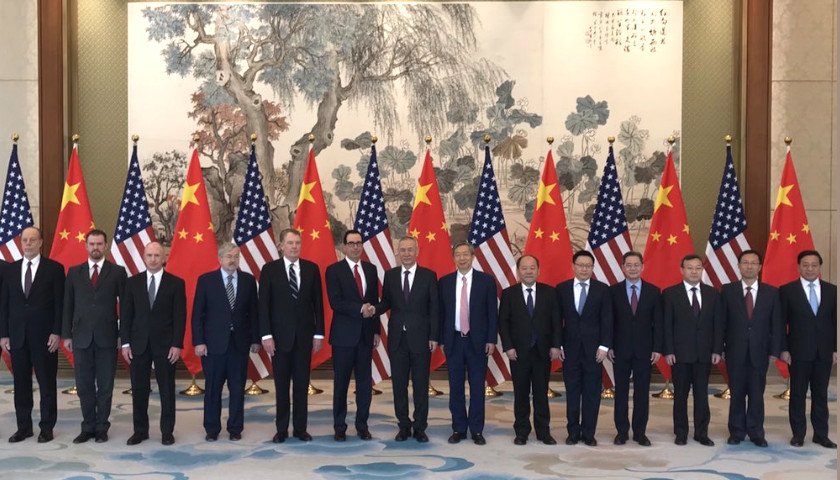American and Chinese trade negotiators made progress during “candid and constructive discussions” in Beijing Friday, said the White House, and will continue talks in Washington next week.
The two sides are working to strike a deal to lift eight-month-old tariffs affecting $250 billion of Chinese imports to the U.S., and about $110 billion of American exports to China.
The latest round of talks comes amid a report by the Bureau of Economic Analysis that the U.S. trade deficit with China again rose in 2018.
“The 2018 goods and services trade deficit with China alone was $379 billion. That’s $70 billion, or 23 percent, higher than in 2016. It’s more than 3 times the size of the 2018 deficit with the entire European Union. China by itself contributed 61 percent of the total US deficit both in 2016 and last year,” according to Derek Scissors, Resident Scholar of American Enterprise Institute.
U.S. Treasury Secretary Steven Mnuchin, who is in Beijing, posted on Twitter that the talks will continue next week.
.@USTradeRep and I concluded constructive trade talks in Beijing. I look forward to welcoming China’s Vice Premier Liu He to continue these important discussions in Washington next week. #USEmbassyChina pic.twitter.com/ikfcDZ10IL
— Steven Mnuchin (@stevenmnuchin1) March 29, 2019
The United States is demanding deep changes to Chinese industrial policy, including an end to large-scale state intervention in markets, subsidies for various industries and policies that force foreign companies to transfer technology to their Chinese partners.
“That’s just wrong; we’ve got to fix it,” said U.S. Secretary of State Mike Pompeo, who ran a small business in Kansas before launching his career in the U.S. government.
Speaking from his personal experience, Pompeo questioned the reciprocity in China’s market access.
“Had I wanted a Chinese company to be my partner for my U.S.-based company in Kansas, they could have,” said Pompeo Thursday evening at an event in Washington.
“Had I wanted to be a partner in a business there, it would have been impossible, and if they would have permitted it, they would have demanded to steal the intellectual property that my company had invested heavily in to do that,” he added.
U.S. President Donald Trump said last week he remains confident the United States can strike a deal with China, but added, “if this isn’t a great deal, I won’t make a deal.”
White House economic adviser Larry Kudlow says the talks are not time-dependent and could last weeks or even months.




